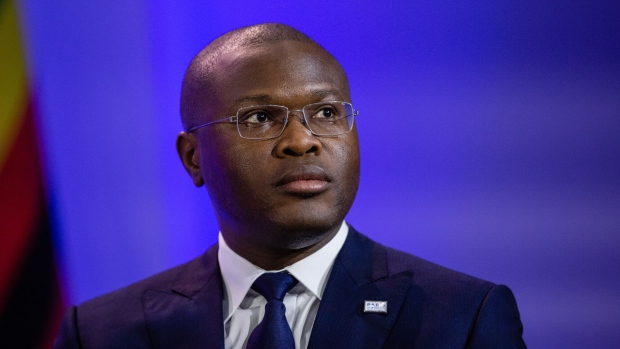Feb 6, 2024
Benin’s Debut Dollar Bonds Oversubscribed by More Than Six Times
, Bloomberg News

(Bloomberg) -- Benin’s debut dollar bond offering was oversubscribed by more than six times as demand for riskier emerging-market assets grows amid expectations of US interest-rate cuts this year.
The West African nation received $5 billion demand and sold $750 million of the debt, Minister of Economy and Finance Romuald Wadagni said in an interview Tuesday. The 14-year instrument, issued at 8.375%, nearly the same rate at which Ivory Coast’s 2037 notes traded earlier on the day, affirms robust demand for junk-rated issuers, Simon Quijano-Evans, chief economist at Gemcorp Capital Management in London, said in a note to clients.
“Who would have thought that Benin would be able to issue its debut USD external bond at a yield flat to or even below what an equivalent Ivory Coast USD bond was trading at earlier today?” Quijano-Evans said. “All the more so, given Ivory Coast is a full ratings notch higher than Benin.”
Benin is rated B+, four levels below investment grade at Fitch Ratings, while the world’s biggest cocoa producer is assessed a notch higher at BB-.
The sale comes just after Ivory Coast resumed sub-Saharan Africa’s market access in January after a two-year hiatus caused by loan distress and the punitive cost of borrowing. Expectations for US interest-rate cuts in 2024 and renewed appetite for riskier assets, partly driven by a lack of new offerings, is now helping issuers.
“Benin euro-denominated bonds have historically been supported by good technicals and the scarcity factor certainly helped in the case of the USD issuance,” said Samir Gadio, head of Africa Strategy at Standard Chartered Plc. “In addition, investors have generally been constructive on Benin’s reform story and value proactive engagement with the market.”
The yield on the country’s euro-denominated notes due 2032 declined 26 basis points to a 21-month low of 7.79% by 1:01 p.m. in London on Wednesday. The rate on its social bond maturing in 2035, the first to be issued in Africa, eased 12 basis points to 7.58%.
Use of Proceeds
The country is among the fastest-expanding economies in sub-Saharan Africa this year, with the International Monetary Fund forecasting gross domestic product growth of 6.3%.
Since starting a new IMF program in 2022, Benin has been focused on making reforms aimed at reducing the budget deficit to 3.7% of GDP this year. The debt ratio should ease to 52.4% of GDP from 53% in 2023, according to the IMF.
Benin will use proceeds from the debut dollar bond sale to finance the 2024 budget, Wadagni said. The funds also enable the country to reduce borrowing on the West African regional market, he said.
(Updates with fresh analyst quote in sixth paragraph.)
©2024 Bloomberg L.P.






